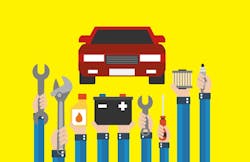A 2016 study conducted by personal finance website NerdWallet found that 64 percent of millennials are surprised by the cost of car maintenance. The study also found that millennials share many of the same attitudes about vehicle ownership as other age groups. That begs the question: If millennials are shocked by the cost, and other generations share this sentiment, how can mechanical repair shops sell maintenance services?
Leah Swartz, senior content specialist at FutureCast, a department within Barkley advertising agency, has written articles on millennial trends and engagement tactics that have been featured in major publications such as Forbes and the New York Times. According to Swartz, the key to getting millennials to invest in vehicle maintenance and turn them into repeat customers is creating a personal connection and establishing trust.
What should shop owners keep in mind when it comes to marketing to millennials?
I think the automotive industry is a ripe category for personalization. When I say personalization, I’m not just talking about the fact that my mechanic knows my name when I come in. I’m talking about a surprise-and-delight feature. A shop that communicates that they know you were here six months ago and provides a reminder and a coupon for an upcoming service will do that. Millennials are all about an environment that says, “I know you, I know what you need, and I’m going to help you.”
We recently conducted a study that looked at the millennial mindset. We took what we knew about millennials with the assumption that this generation is the most influential of all consumer groups. We put a survey out to the general population and we saw that there are six key drivers to the millennial mindset: innovation, purposeful, accessible, social circle, self and trusted. “Trusted” is the most important mindset for the auto industry, followed by “social circle.” “Trusted” accounts for 48 percent of millennial-mindset brand preference and “social circle” accounts for 23 percent.
When it’s broken down by gender, the most impactful driver for millennial men is “social circle” and for women, it’s “trusted.” What that means is that men are looking for a shop that people are recommending and one they can talk about with their friends. Women are looking for a shop that they can trust and that keeps its promise. Knowing this, shop owners should be working on getting customers to talk about their brand beyond social media. It’s necessary to be on social media but that’s not the secret—it’s how you get people to talk about your brand that will get millennials to come in.
Personalization seems like something that all generations would appreciate. Is there really a huge difference in marketing to millennials than to other generations?
Yes and no. I think that different generations have a different set of needs but if you’re really looking at what’s impacting the general market, millennials have a huge impact. If you create a target campaign that’s directed toward millennials, it’s more likely to message up to other generations. I’m not saying that this is the end-all-be-all and that you can’t segment and create a campaign and messaging platform based on different needs, but we have seen that when something attracts the millennial generation, it’s likely to influence all.
Why do you think millennials are hesitant to invest in maintaining their vehicles?
We like to refer to the millennial generation as a trade-up, trade-down generation. What’s important to note about this generation is that this is a group that graduated college and got into their first career around 2008, which was the height of the recession. When it was their time to hit the job market, the reality of the recession hit them full force and they had to reimagine their financial capabilities. This leads to the trade-up, trade-down principle. Things that millennials have deemed valuable and necessary for their lives are what they’ll trade up for. Things that they can budget, they’ll trade down.
The assumption that I’ll make on why a high percentage of millennials are shocked by the cost is that the automotive industry is so crowded that there are always cost-cutting ways that they can approach auto maintenance with and millennials are always looking for those deals.
What would be an effective way to market a service, such as an oil change, to a millennial?
I think an example of something that works really well goes back to personalization. Do you know me? Do you actually know what kind of car I drive? Do you know what I use my car for? Imagine getting a standard discount coupon straight to your house for $25 off. Now, imagine getting a personalized text message that says something along the lines of, “Hey, Leah, we know you’re driving every day to get your kid to school. Let us help you with that—here’s $25 off your next oil change.” That approach will be much more effective.
Once a millennial has come into the shop, what can be done to keep them as a customer for life?
A great way to do this is through a customer relationship management program. This is something that’s incredibly important for the automotive industry. It’s all about creating multiple touch points and reminders and being involved with customers. It doesn’t necessarily mean sending out a direct mailer every month. It could be as simple as sending an automated text that says, “Hey, have a great drive today.” It’s things like that that will keep you top of mind.


